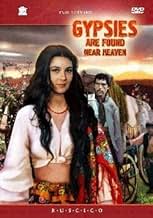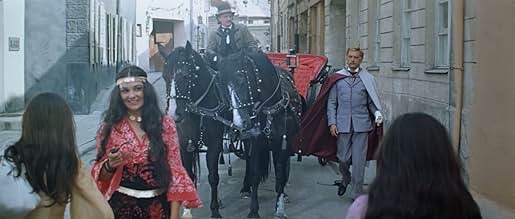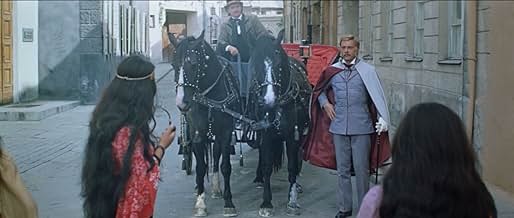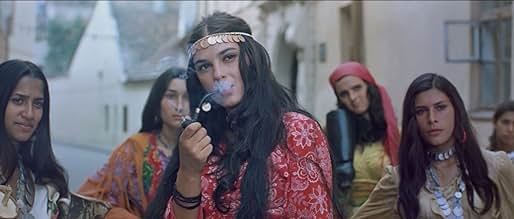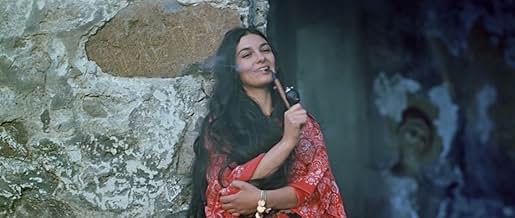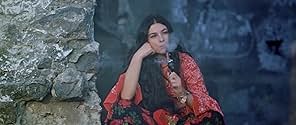IMDb RATING
7.3/10
2K
YOUR RATING
Rada, a beautiful and very proud gipsy girl is used to steal men's hearts and monk them. Zobar is a horse thief who's heart is stolen by Rada and his mind is bewitched. He is ready to give u... Read allRada, a beautiful and very proud gipsy girl is used to steal men's hearts and monk them. Zobar is a horse thief who's heart is stolen by Rada and his mind is bewitched. He is ready to give up his freedom but not his pride.Rada, a beautiful and very proud gipsy girl is used to steal men's hearts and monk them. Zobar is a horse thief who's heart is stolen by Rada and his mind is bewitched. He is ready to give up his freedom but not his pride.
- Awards
- 1 win & 1 nomination total
Grigore Grigoriu
- Loiko Zobar
- (as Grigori Grigoriu)
Barasbi Mulayev
- Makar Chudra
- (as B. Mulayev)
Boryslav Brondukov
- Bucha
- (as Borislav Brondukov)
Vasyl Symchych
- Balint
- (as Vasili Simchich)
- Director
- Writers
- All cast & crew
- Production, box office & more at IMDbPro
Featured reviews
In the film there is no Romanian cast, all of the characters are played by Soviet actors. Moreover, with all of more or less authentic Gypsy features it has nothing to do with actual Gypsies. Gypsies here are metaphoric of some kind of people who follow different laws and rules than ordinary people; they are people who prefer the spiritual to the material, freedom to routine, passion to compromise, etc. With this approach most of the criticism expressed in some of the previous comments becomes irrelevant.
In the USSR there was no sex, it's true. There was passion and love -- love that burns.
Love that burns -- that's what the film tells about, and for this good cause all means is of use: transgression, tantra, pagan cults, dionysism, dark magic. This story can be named as well a Russian Carmen. Brilliant performance of Emil Lotjanu (director), Eugene Doga (music), Serguey Vronsky (photography), Svetlana Toma (awarded as the best Soviet actress of the year for the part of Rada), Grigore Grigoriu(Zobar), Borislav Brondukov (Buca) and others. Great art of a great civilization. Get it and enjoy seeing.
In the USSR there was no sex, it's true. There was passion and love -- love that burns.
Love that burns -- that's what the film tells about, and for this good cause all means is of use: transgression, tantra, pagan cults, dionysism, dark magic. This story can be named as well a Russian Carmen. Brilliant performance of Emil Lotjanu (director), Eugene Doga (music), Serguey Vronsky (photography), Svetlana Toma (awarded as the best Soviet actress of the year for the part of Rada), Grigore Grigoriu(Zobar), Borislav Brondukov (Buca) and others. Great art of a great civilization. Get it and enjoy seeing.
A poem about freedom and love. A strange world of joy, ambitions and desires. A form of escape and a colorful dream.
Emil Loteanu was a special director for the way chosen. His movies, products of Sovietic cinema, are, very often, touching skits of a raw cardboard's space. The stake- to prove the identity of a small nation in a empire. The means- Russian art of purlieus. Accent on the dramatic themes and emotions like only message.
"Tabor ukhodit v nebo" is only a picturesque film about a imaginary community. His importance is not small because the Gipsys are the product, in the self-image ,of this movie, slice of a possible golden age at the beginning of XXth century. In same time, it is a good introduction to Kusturica filmography, with the aspects of a ambiguous Balkan's life, with songs and carousals with barbarian persistent taste, with full of color atmosphere and any way of business.
So, a good film for Bovaric public, for the Kakania's nostalgics, for amateurs of subtle kitsch, for the fans of actors, for old Gipsys or dreamers. But, in fact,it is only a ethnographic foray in Maxim Gorki's pathetic universe. Eastern Europe- like a strange endless Gypsy's song.
Emil Loteanu was a special director for the way chosen. His movies, products of Sovietic cinema, are, very often, touching skits of a raw cardboard's space. The stake- to prove the identity of a small nation in a empire. The means- Russian art of purlieus. Accent on the dramatic themes and emotions like only message.
"Tabor ukhodit v nebo" is only a picturesque film about a imaginary community. His importance is not small because the Gipsys are the product, in the self-image ,of this movie, slice of a possible golden age at the beginning of XXth century. In same time, it is a good introduction to Kusturica filmography, with the aspects of a ambiguous Balkan's life, with songs and carousals with barbarian persistent taste, with full of color atmosphere and any way of business.
So, a good film for Bovaric public, for the Kakania's nostalgics, for amateurs of subtle kitsch, for the fans of actors, for old Gipsys or dreamers. But, in fact,it is only a ethnographic foray in Maxim Gorki's pathetic universe. Eastern Europe- like a strange endless Gypsy's song.
This film, known as "Satra" - a group of wandering gypsies - to the Romanians is definitely worth viewing. Based on a short novel by Gorki, it gives a snapshot of Gypsy life in the Far-Eastern part of the Habsburg Empire. Nevertheless, the film is a bit diminished by its 1970s-Soviet origin: many badly played-back songs, a soundtrack that tends to give a hippy-70s flavors to the Gypsy songs. I'm not so enthusiastic about the work of the composer who rather spoiled the Gypsy music than improved it. In this domain, Goran Bregovici keeps the lead. The RUSCICO DVD edition includes some interesting bonus though not very enlightening. Notice that the script was refused by the Moldovan Film Studios so that it was shot by the Moscow film studios.
I love this movie. It reminds me of my colorful childhood. The director was an amazing person and he is the pride of our country. The soundtrack composed by Eugen Doga are simply perfect. I have just one issue here. In the summary, there is a mistake that really bothers and
I would like to be fixed because it will confuse people that don't know anything about the history of Moldova. Bessarabia is not a part of Moldova. It is MOLDOVA. My country has two names - Moldova or Bessarabia. I know it's pretty messy and confusing, but that's how it is. I want proper information, regarding the movie.
Overall, I love to see the movies made in Eastern Europe are listed here.
I would like to be fixed because it will confuse people that don't know anything about the history of Moldova. Bessarabia is not a part of Moldova. It is MOLDOVA. My country has two names - Moldova or Bessarabia. I know it's pretty messy and confusing, but that's how it is. I want proper information, regarding the movie.
Overall, I love to see the movies made in Eastern Europe are listed here.
it is simply the best gypsy movie, translating so well their thirst of
freedom, for 'the road'...i saw it on tv as 'Les Tziganes s'en vont
vers les cieux, in a children-family program, but i think it surpasses
all the Kusturica-Gatlif spoofs depicting Gypsies. This one here depicts all the tragedy of the gypsy people, torn
between materialism and freedom. The opening is a piece of anthology as the old sage predicts
Zabor his near future and warns him : Dont trust any woman...and
remember that freedom is the most important value...' And ahhh....Svetlana!!! so marvelous dancing and saying to Zabor
: 'Dont look at me this way, it's forbidden...' To see for the proudness, the height of the feelings, the friendship,
the love, so pure....but leading to tragic endings in a gadjo world... a must for gypsy-movies lovers as much as : Autrefois, nous étions des oiseaux, from Garri
Bardine
freedom, for 'the road'...i saw it on tv as 'Les Tziganes s'en vont
vers les cieux, in a children-family program, but i think it surpasses
all the Kusturica-Gatlif spoofs depicting Gypsies. This one here depicts all the tragedy of the gypsy people, torn
between materialism and freedom. The opening is a piece of anthology as the old sage predicts
Zabor his near future and warns him : Dont trust any woman...and
remember that freedom is the most important value...' And ahhh....Svetlana!!! so marvelous dancing and saying to Zabor
: 'Dont look at me this way, it's forbidden...' To see for the proudness, the height of the feelings, the friendship,
the love, so pure....but leading to tragic endings in a gadjo world... a must for gypsy-movies lovers as much as : Autrefois, nous étions des oiseaux, from Garri
Bardine
Did you know
- ConnectionsFeatured in Legendy mirovogo kino: Emil Loteanu
- SoundtracksNane Tsokha
Performed by Alyona Buzylyova
- How long is Queen of the Gypsies?Powered by Alexa
Details
- Release date
- Country of origin
- Language
- Also known as
- Queen of the Gypsies
- Filming locations
- Production company
- See more company credits at IMDbPro
- Runtime1 hour 41 minutes
- Color
- Aspect ratio
- 2.20 : 1
Contribute to this page
Suggest an edit or add missing content

